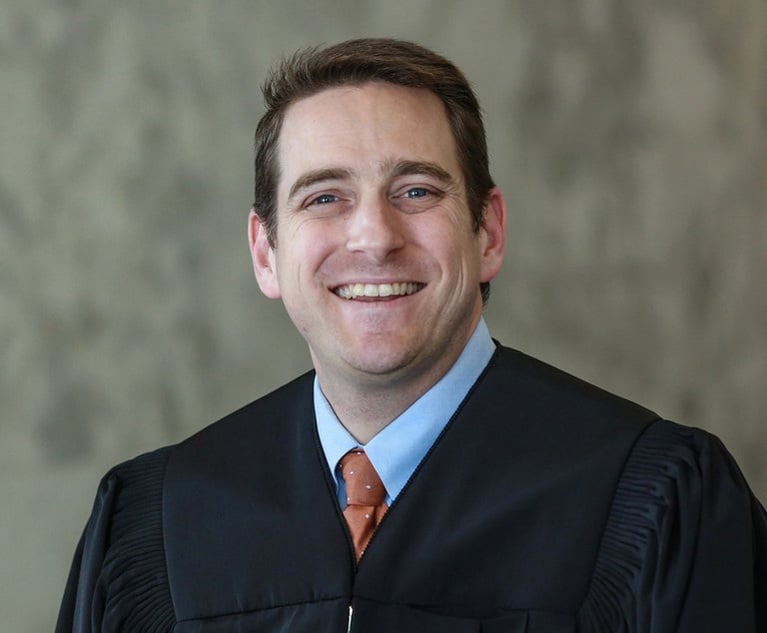Will 'Forever Chemicals' Be the Next Big Toxic Tort?
Plaintiffs lawyer Scott Summy, of Baron & Budd, said "forever chemicals," discovered in the drinking water of several communities, "are probably the largest environmental hazard in the country right now."
February 03, 2020 at 03:45 PM
10 minute read
The original version of this story was published on Law.com
 Day Foot Rd. crosses over Little Hoosic River in Petersburg, New York.
Day Foot Rd. crosses over Little Hoosic River in Petersburg, New York.
In southwestern Vermont, residents of the town of Bennington sued in 2016 after state officials determined that a local company, Saint-Gobain Performance Plastics Corp., discharged the toxic chemical perfluorooctanoic acid, or PFOA, through its smokestacks. Over decades, the chemicals seeped into the groundwater, contaminating the drinking water supply for more than 2,000 property owners.
Last month, in a key ruling, a federal judge refused to toss the claims on summary judgment, and set the case for a July 6 trial.
The case is one of several percolating through the courts involving so-called "forever chemicals," which do not biodegrade in the ground or in the human body. Lawyers representing area residents began filing class actions about five years ago, but judges recently have issued rulings on dismissal and class certification. In the past year, attorneys general in several states, water utilities and individuals exposed to the chemical have brought additional lawsuits.
Lawyers expect more cases to come.
"It's going to be big, and it's going to grow," said Scott Summy, head of Baron & Budd's environmental litigation group and co-lead counsel in multidistrict litigation brought over "forever chemicals" used in firefighting foam. "These 'forever chemicals' are probably the largest environmental hazard in the country right now."
The multidistrict litigation, in South Carolina, involves several defendants, including 3M Co. and E. I. du Pont de Nemours and Co., key players that sold "forever chemicals" to other manufacturers. The plaintiffs in the MDL include individuals with medical problems, water utilities paying for the damage and attorneys general in several states, whose cases are now part of the MDL.
Lawyers said the recent court decisions, like the one in Vermont, have helped trigger the explosion of new cases.
"Courts around the country are treating this seriously, and classes are certified," said James Bilsborrow, an associate at Weitz & Luxenberg in New York, whose firm represents the plaintiffs in two class actions brought on behalf of residents of upstate New York against Saint-Gobain and another manufacturer, Taconic. "That sets a precedent generally that this is a serious chemical that calls for a solution to the courts."
How it started
Knowledge of "forever chemicals" is not new. As depicted in the 2019 film "Dark Waters," West Virginia residents sued DuPont over water contamination in the Ohio River. Those cases focused on C8, a type of PFOA, used to make Teflon and other household items and linked to cancer and other illnesses. In 2017, DuPont settled 3,550 lawsuits in the multidistrict litigation for $670 million.
The settlement, however, did not include medical monitoring, said Michael London, of New York's Douglas & London, co-lead counsel in the C8 multidistrict litigation. As a result, residents with cancer diagnoses during the period after the settlement have continued to file suits, and a consolidated trial of six plaintiffs starts in June.
But it wasn't just the Ohio River. Absent federal regulation of "forever chemicals," states have begun to impose regulation, Summy said. That's led other cities, or their water providers, to discover "forever chemicals" in their groundwater, prompting lawyers to file more class actions, he said.
One prolific region for class actions was in Vermont and adjoining upstate New York and New Hampshire, where Saint-Gobain and its subsidiaries had several facilities. So far, judges have certified three separate class actions brought by residents in those states and, in two of the cases, set trial dates for this year. Mark Cheffo and Sheila Birnbaum, New York partners at Dechert who represent Saint-Gobain in all three cases, did not respond to a request for comment.
In a Sept. 6 petition asking the U.S. Court of Appeals for the Second Circuit to vacate an Aug. 23 order certifying the class in the Vermont case, Saint-Gobain acknowledged the raft of "forever chemicals" class actions filed in the past three years.
"Many similar putative class actions involving PFOA are pending in the district courts, within this Circuit and around the country," wrote Birnbaum, Saint-Gobain's attorney. "The district courts in those cases face substantially similar legal issues and would benefit greatly from this court's guidance now—before substantial judicial and party resources are spent adjudicating the same questions."
The U.S. Chamber of Commerce and two other groups, in an amicus brief, warned about a "flood of time-consuming, expensive, and abusive litigation," in part due to the Vermont certification order.
The Second Circuit refused to take up the interlocutory appeal Jan. 17.
Saint-Gobain and Taconic have lost key rulings in other cases.
Taconic lost a summary judgment motion Jan. 24, when a New York Supreme Court judge refused to toss claims associated with its fabric coating plant in Petersburg, New York.
"The court finds that there are issues of fact as to whether defendant knew the potential health effects of PFOA, and that it had contaminated the wells and soil of some of its employees and tenants, but failed to take any steps to share PFOA-related information with the greater community," wrote Supreme Court Judge Patrick McGrath in Troy, New York.
In that case, Bilsborrow said he hopes to go to trial later this year.
In allowing claims to go forward, judges in both the Taconic and Vermont cases cited a 2017 class certification decision by a federal judge in a "forever chemicals" case brought by residents of nearby Hoosick Falls, New York, against Saint-Gobain and Honeywell International Inc. In that case, U.S. District Judge Lawrence Kahn of the Northern District of New York, wrote, "Society has a reasonable expectation that manufacturers avoid contaminating the surrounding environment, an expectation that extends to the pollution of an area's water supply."
The defendants have sought reversal of Kahn's ruling from the Second Circuit, which has yet to rule.
Other class actions are pending in Michigan, against 3M and shoe manufacturer Wolverine World Wide over alleged "forever chemicals" near Rockford, and in Alabama, against 3M and chemical products manufacturer Daikin America Inc., by residents near Decatur claiming contamination of the Tennessee River.
More regions could be the subject of new class actions as Congress faces pressure to pass legislation that would provide financial aid to states and impose federal regulation of "forever chemicals." According to a report by the Environmental Working Group last month, water samples of dozens of cities, such as Miami, Philadelphia and New Jersey suburbs of New York, found varying levels of PFAS chemicals in the drinking water.
The claims
The cases against 3M and DuPont allege both companies knew for decades that "forever chemicals" were toxic in humans.
"DuPont and 3M and others failed to disclose to the EPA under proper federal laws that they believed there was reason to be concerned about these chemicals," said Emily Joselson, of Langrock Sperry & Wool in Middlebury, Vermont. "They didn't report it to the EPA, and it failed to be on EPA's regulatory list, and so environmental agencies were also relatively unaware of this chemical, so this chemical wasn't put on discharge permits."
The class actions seek compensation for costs and diminution of value of their properties, which either relied on contaminated wells or the town's water supply, but they also seek medical costs. In general, the defendants have insisted they complied with government regulations at the time and, as to class certification, many point to the varying health circumstances of each resident.
Much of the focus, however, is on whether residents alleged actual injuries. Plaintiffs attorneys point to tests that show the presence of "forever chemicals" in the blood, and, in some cases, residents who have various forms of cancer.
Defendant companies challenge whether any harm exists, particularly as to asymptomatic plaintiffs seeking medical monitoring.
In the Vermont case, Chief U.S. District Judge Geoffrey Crawford of the District of Vermont on Dec. 27 refused to toss medical monitoring claims, which seek payment from corporations for the medical costs associated with testing residents for potential illness. Not all states allow medical monitoring, and judges have split on whether to allow such claims.
"The court ruled that yes, Vermont has and will continue to recognize the remedy of medical monitoring, and articulated the elements to be proven in order to prevail in a claim for the remedy of medical monitoring," Joselson said. "The issue will be resolved in trial."
In North Carolina, U.S. District Judge James Dever of the Eastern District of North Carolina refused April 19 to allow medical monitoring or public nuisance claims to go forward in a class action against DuPont and its former subsidiary, The Chemours Co., alleging contamination of Cape Fear River near Fayetteville, North Carolina. The defendants, represented by John Sherk, a San Francisco partner at Shook, Hardy & Bacon, have moved to toss an amended complaint that seeks future medical expenses, such as blood tests.
"We didn't plead medical monitoring. We pled personal injury-type claims to proceed forward on the type of care needed: blood tests, and things of that sort," said Ted Leopold, a partner at Cohen Milstein Sellers & Toll in Palm Beach, Florida. Whether the judge grants the new dismissal motion "is up in the air," he said.
In an amicus brief filed in 2018 before the Second Circuit in the Hoosick Falls case, the U.S. Chamber of Commerce and two other defense bar groups argued that medical monitoring was unavailable in New York. David Venderbush, counsel at Alston & Bird in New York, who filed the amicus brief, questioned whether medical monitoring has any practical effect.
"Or are they ways for plaintiffs' attorneys to generate fees through awards on causes of action or remedies that aren't actually necessary because it's unclear that anyone's been hurt because no one's manifested any problems?" he said. "To us, that's just fuel for the fire to file more class actions and try to get a medical monitoring remedy and ask the court to award you fees based on the value of the medical monitoring program, and that's just a jobs program for plaintiffs' lawyers."
Meanwhile, attorneys general in Vermont, New Hampshire, New Jersey, Ohio, New Mexico and, last month, Michigan, continue to file their own lawsuits against DuPont, 3M and others.
Some of those cases were transferred to the MDL in South Carolina, which focuses on a related chemical called perfluorooctane sulfonic acid, or PFOS, found in firefighting foams used on U.S. military bases and airports. Summy said the focus right now of the MDL, which comprises a "hodgepodge" of plaintiffs, is on general liability—or, how much the defendants knew about the dangers of "forever chemicals."
Among the defendants is the U.S. government.
Many of the defendants, including 3M and DuPont, have filed preliminary statements of affirmative defenses that include immunity from suit as government contractors. Joseph Petrosinelli, of Williams & Connolly in Washington, D.C., co-lead defense counsel in the cases, did not respond to a request for comment.
But London, another co-lead counsel in the MDL, cast doubt on the success of that defense.
"Each company hid the dangers from the U.S. government as much as they hid them from the American public," he said. "We don't believe there's much credibility to the government contractor defense."
This content has been archived. It is available through our partners, LexisNexis® and Bloomberg Law.
To view this content, please continue to their sites.
Not a Lexis Subscriber?
Subscribe Now
Not a Bloomberg Law Subscriber?
Subscribe Now
NOT FOR REPRINT
© 2025 ALM Global, LLC, All Rights Reserved. Request academic re-use from www.copyright.com. All other uses, submit a request to [email protected]. For more information visit Asset & Logo Licensing.
You Might Like
View All
Litigators of the Week: US Soccer and MLS Fend Off Claims They Conspired to Scuttle Rival League’s Prospect

‘Listen, Listen, Listen’: Some Practice Tips From Judges in the Oakland Federal Courthouse
Law Firms Mentioned
Trending Stories
- 1States Accuse Trump of Thwarting Court's Funding Restoration Order
- 2Microsoft Becomes Latest Tech Company to Face Claims of Stealing Marketing Commissions From Influencers
- 3Coral Gables Attorney Busted for Stalking Lawyer
- 4Trump's DOJ Delays Releasing Jan. 6 FBI Agents List Under Consent Order
- 5Securities Report Says That 2024 Settlements Passed a Total of $5.2B
Who Got The Work
J. Brugh Lower of Gibbons has entered an appearance for industrial equipment supplier Devco Corporation in a pending trademark infringement lawsuit. The suit, accusing the defendant of selling knock-off Graco products, was filed Dec. 18 in New Jersey District Court by Rivkin Radler on behalf of Graco Inc. and Graco Minnesota. The case, assigned to U.S. District Judge Zahid N. Quraishi, is 3:24-cv-11294, Graco Inc. et al v. Devco Corporation.
Who Got The Work
Rebecca Maller-Stein and Kent A. Yalowitz of Arnold & Porter Kaye Scholer have entered their appearances for Hanaco Venture Capital and its executives, Lior Prosor and David Frankel, in a pending securities lawsuit. The action, filed on Dec. 24 in New York Southern District Court by Zell, Aron & Co. on behalf of Goldeneye Advisors, accuses the defendants of negligently and fraudulently managing the plaintiff's $1 million investment. The case, assigned to U.S. District Judge Vernon S. Broderick, is 1:24-cv-09918, Goldeneye Advisors, LLC v. Hanaco Venture Capital, Ltd. et al.
Who Got The Work
Attorneys from A&O Shearman has stepped in as defense counsel for Toronto-Dominion Bank and other defendants in a pending securities class action. The suit, filed Dec. 11 in New York Southern District Court by Bleichmar Fonti & Auld, accuses the defendants of concealing the bank's 'pervasive' deficiencies in regards to its compliance with the Bank Secrecy Act and the quality of its anti-money laundering controls. The case, assigned to U.S. District Judge Arun Subramanian, is 1:24-cv-09445, Gonzalez v. The Toronto-Dominion Bank et al.
Who Got The Work
Crown Castle International, a Pennsylvania company providing shared communications infrastructure, has turned to Luke D. Wolf of Gordon Rees Scully Mansukhani to fend off a pending breach-of-contract lawsuit. The court action, filed Nov. 25 in Michigan Eastern District Court by Hooper Hathaway PC on behalf of The Town Residences LLC, accuses Crown Castle of failing to transfer approximately $30,000 in utility payments from T-Mobile in breach of a roof-top lease and assignment agreement. The case, assigned to U.S. District Judge Susan K. Declercq, is 2:24-cv-13131, The Town Residences LLC v. T-Mobile US, Inc. et al.
Who Got The Work
Wilfred P. Coronato and Daniel M. Schwartz of McCarter & English have stepped in as defense counsel to Electrolux Home Products Inc. in a pending product liability lawsuit. The court action, filed Nov. 26 in New York Eastern District Court by Poulos Lopiccolo PC and Nagel Rice LLP on behalf of David Stern, alleges that the defendant's refrigerators’ drawers and shelving repeatedly break and fall apart within months after purchase. The case, assigned to U.S. District Judge Joan M. Azrack, is 2:24-cv-08204, Stern v. Electrolux Home Products, Inc.
Featured Firms
Law Offices of Gary Martin Hays & Associates, P.C.
(470) 294-1674
Law Offices of Mark E. Salomone
(857) 444-6468
Smith & Hassler
(713) 739-1250








